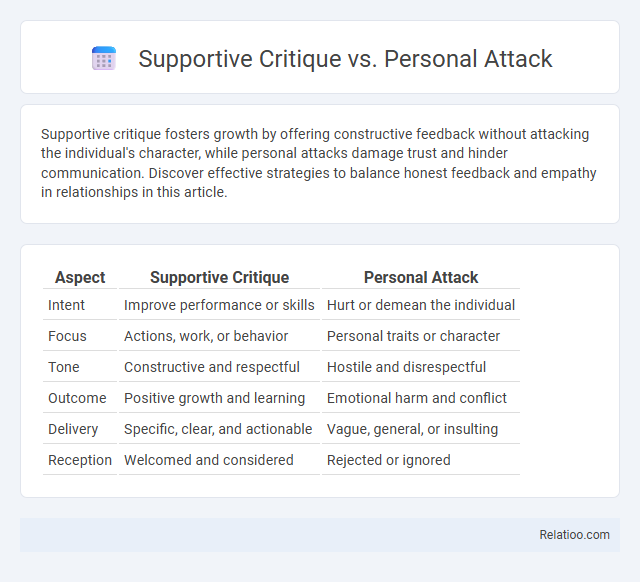Supportive critique fosters growth by offering constructive feedback without attacking the individual's character, while personal attacks damage trust and hinder communication. Discover effective strategies to balance honest feedback and empathy in relationships in this article.
Table of Comparison
| Aspect | Supportive Critique | Personal Attack |
|---|---|---|
| Intent | Improve performance or skills | Hurt or demean the individual |
| Focus | Actions, work, or behavior | Personal traits or character |
| Tone | Constructive and respectful | Hostile and disrespectful |
| Outcome | Positive growth and learning | Emotional harm and conflict |
| Delivery | Specific, clear, and actionable | Vague, general, or insulting |
| Reception | Welcomed and considered | Rejected or ignored |
Understanding Supportive Critique
Supportive critique offers constructive feedback aimed at fostering growth and improvement by addressing specific behaviors or outcomes rather than personal traits. It emphasizes clear communication, empathy, and actionable suggestions to guide positive change while maintaining respect for the individual. Understanding supportive critique involves recognizing its role in building trust and collaboration, distinguishing it fundamentally from personal attacks that target character and intent.
Defining Personal Attack
A personal attack involves targeting an individual's character, motives, or personal traits rather than addressing the content or quality of their ideas or arguments. Unlike supportive critique, which provides constructive feedback aimed at improving understanding or performance, personal attacks undermine productive dialogue by shifting focus to irrelevant personal aspects. Identifying intent is crucial, as personal attacks often aim to harm, discredit, or intimidate, contrasting with critiques designed to support growth or clarity.
Key Differences Between Critique and Attack
Supportive critique aims to provide constructive feedback focused on improving ideas or performance, emphasizing objective analysis and specific suggestions. Personal attacks target an individual's character or traits rather than their work, often employing emotional or derogatory language. The intent behind a critique is to foster growth and development, while an attack seeks to undermine or belittle, highlighting the fundamental difference in purpose and delivery.
The Importance of Tone in Feedback
Tone in feedback critically distinguishes supportive critique from personal attack by maintaining respect and focusing on constructive improvement rather than judgment. Your ability to convey intent through a calm and objective tone ensures the recipient perceives the message as helpful, fostering growth and collaboration. Misinterpreting tone often leads to defensiveness, highlighting the importance of carefully choosing words to promote positive outcomes.
Identifying Constructive vs Destructive Comments
Supportive critique focuses on providing specific, actionable feedback aimed at improving work or behavior, while personal attacks target an individual's character rather than their actions, creating a hostile environment. Identifying constructive comments involves recognizing intent to help and foster growth, as opposed to destructive comments that seek to undermine or belittle. Your ability to discern the underlying intent behind feedback ensures more productive communication and healthier interactions.
Impact of Supportive Critique on Growth
Supportive critique fosters constructive feedback by focusing on specific behaviors and outcomes rather than personal attributes, significantly enhancing individual growth and performance. Differentiating between supportive critique and personal attacks is crucial, as the latter undermines confidence and hampers development through negative intent and emotional harm. Emphasizing intent in feedback ensures that the impact of supportive critique motivates improvement, builds trust, and cultivates a positive learning environment.
Consequences of Personal Attacks
Personal attacks undermine constructive dialogue by shifting focus from ideas to individual character, damaging your credibility and relationships. They often provoke defensiveness and hostility, escalating conflicts and reducing the chances of resolution. Consequences of personal attacks include erosion of trust, weakened collaboration, and long-term harm to personal and professional reputations.
Strategies to Give Effective Critique
Effective critique emphasizes objective feedback focused on specific behaviors or work rather than personal traits, ensuring clarity and respect in communication. Strategies include using evidence-based observations, framing comments as suggestions for improvement, and maintaining a neutral tone to avoid personal attacks. Understanding the intent behind feedback helps differentiate constructive critique from harmful comments, promoting growth and trust in professional or creative environments.
How to Respond to Personal Attacks
Responding to personal attacks requires maintaining composure and addressing the behavior rather than the individual, which helps de-escalate conflict and preserve constructive dialogue. Supportive critique focuses on addressing ideas and actions with specific, actionable feedback, whereas personal attacks target character or motives, often rooted in emotional intent rather than objective evaluation. Recognizing the intent behind comments allows for differentiating defensive or malicious personal attacks from genuine criticism, enabling a more measured and effective response strategy.
Fostering Respectful Communication
Supportive critique centers on constructive feedback aimed at growth, focusing on specific behaviors rather than personal traits, which fosters respectful communication in your interactions. Personal attacks, by contrast, target an individual's character or identity, undermining trust and escalating conflicts. Intent plays a crucial role in distinguishing feedback from attack, as genuine support promotes understanding and collaboration essential for a positive dialogue.

Infographic: Supportive Critique vs Personal Attack
 relatioo.com
relatioo.com